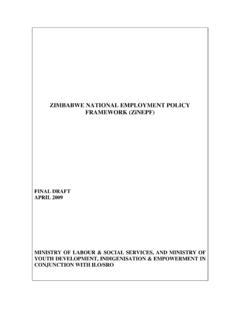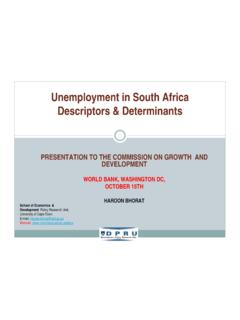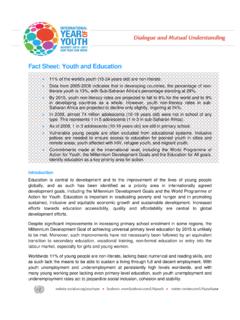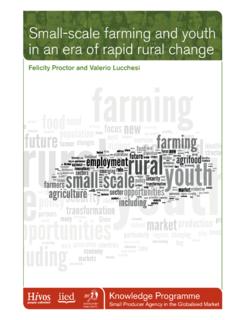Transcription of Understanding Barriers to Research Report # 1 Accessing ...
1 Understanding Barriers to Research Report # 1. Accessing skills development and employment for youth in Argentina and South africa : Synthesis Report Peliwe LOLWANA, Siphelo NGCWANGU, Claudia JACINTO, Ver nica MILLENAAR, Mar a Eugenia MART N. December 2015. Network for international policies and cooperation in education and training About IDES: The IDES (Instituto de Desarrollo Economico y Social) is a private, non-profit, academic institute devoted to the study of economic, social, historical, political and cultural issues. Its activities are divided into three main areas: 1) Research programmes, 2) graduate courses, and 3) the dissemination of scientific Research , particularly through the social science journal Desarollo Econ mico. It provides a forum for academic debate and policy implication analysis, with emphasis on the problems faced by Argentina and Latin America. In 2013, it created the Centre for Social Research (CIS) which it administers jointly with the National Scientific and Technical Research Council (CONICET).
2 About REAL: The Centre for Researching Education and Labour (REAL) is an established Research centre in the School of Education at the University of the Witwatersrand in Johannesburg, South africa . It conducts projects into important policy areas in education and training, focusing on the complex relationships between education, knowledge, work, the economy, and society. REAL brings together researchers from different disciplines, builds theoretical and systemic insights based on empirical Research , improves the quality of empirical Research , develops insights across different Research areas, and contributes to national policy debates. About NORRAG: NORRAG is an independent multi-stakeholders network hosted by the Graduate Institute of International and development Studies (IHEID) in Geneva, Switzerland, seeking to inform, challenge and influence international education and training policies and cooperation.
3 Through networking and other forms of cooperation and institutional partnerships, it aims in particular to stimulate and disseminate timely, innovative and critical analysis and to serve as a knowledge broker at the interface between Research , policy and practice. As of February 2016 NORRAG has more than 4,500 registered members in about 170 countries, with 47% from the global South. NORRAG is supported by the Swiss Agency for development and Cooperation (SDC), the Open Society Foundations and the Ministry of Higher Education of the Sultanate of Oman. About the Collaborative Programme of Work between REAL and NORRAG: REAL and NORRAG have established an International Collaborative Programme of Work in Education, skills and Labour Policy. The broad purpose of the programme is the sharing and dissemination of their knowledge, Research , insights and perspectives with local, regional and international stakeholders.
4 The joint vision is to engage in the fields of knowledge creation and dissemination as well as policy dialogue on skills development , education and labour, with the aim of contributing in an informed and evidence-based manner to the South African, regional, continental and international debates on skills , education and training policies. The overall objective is to improve the quality of Technical and Vocational Education and skills development . Foreword This Synthesis Report of the study Understanding Barriers to Accessing skills development and employment for youth in Argentina and South africa is the product of two years of work across three continents (Europe, Latin America and africa ) between three institutions: NORRAG in Switzerland, the REAL Centre at the University of the Witwatersrand in South africa , and PREJET at IDES in Argentina. The study brings together interdisciplinary Research perspectives in order to study a critical challenge to both developing and developed countries in the world today: rising youth unemployment resulting in large numbers of young people being unable to access employment or skills development .
5 South africa and Argentina provide a varied context for studying Barriers to youth employment and skills since both countries are faced with the challenges of pursuing social justice within difficult economic conditions. This study is organized around the notions of People, Policy and Institutions in order to explore the interconnection between these agencies while Understanding Barriers . Increasingly, the problem of youth unemployment has tended to be treated as an individual problem by illustrating the skills deficits' of young people rather than taking into account the critical role of public policy and institutions that mediate access to skills training and employment . The study is grounded in two sectors Wine and Construction. These present a useful context for Understanding Barriers in the light of structural factors. These two sectors demonstrate similarities in regulation but simultaneously show differences in areas such as the role of trade unions in Accessing skills development .
6 The study makes a contribution to the growing body of Research on youth unemployment and access to skills development in both the academic and policy development literature. Policymakers in both countries will find the Report to be a useful resource for policy development and analysis which will inform future planning within the broad arena of youth development . The study is a significant contribution to the literature on international cooperation from a South South . North' perspective, bringing together insights that were submitted to a cross-fertilization process in which national, regional and international perspectives were called upon. The three involved organisations do hope that the study will demonstrate the innovative capacity of the South South North Triangular Cooperation. The full country reports are available on the NORRAG website. Peliwe Lolwana Claudia Jacinto Michel Carton REAL Centre IDES, PREJET NORRAG.
7 University of the Witwatersrand University of Buenos Aires Geneva South africa Argentina Switzerland About the Authors South africa Ms Peliwe Lolwana, Former Director of the Centre for Researching Education and Labour (REAL), University of the Witwatersrand, South africa Email: Mr Siphelo Ngcwangu, Associate Researcher, University of the Witwatersrand, South africa Email: Argentina Claudia Jacinto, Coordinator of PREJET (Programa de Estudios de Juventud, Educaci n y Trabajo) at IDES (Instituto de Desarrollo Economico y Social) and Senior Researcher at the National Scientific and Technical Research Council (CONICET), Buenos Aires, Argentina Email: Ver nica Millenaar, IDES Associate Researcher Email: Mar a Eugenia Martin, CONICET Fellow Researcher at the Universidad Nacional de Cuyo Email: PREJET team members participating in the study: Alejandro Burgos, Delfina Garino, Eugenia Roberti, Mariana Sosa and Carolina Dursi, CONICET doctoral fellows.
8 Lucia D'Angelo, Research Assistant at the Universidad Nacional de Cuyo. Acknowledgements The REAL centre team would like to thank a number of institutions that supported this study by making themselves or their organizations available for interviews, or by providing access to information which was critical to the study. In the Wine sector we would like to acknowledge the following institutions and individuals for their support: Elsenburg College, Pinotage youth development Agency (PYDA), Taste of Training, Vinpro, South African Wine Industry Statistics (SAWIS), Wine Tech, Solms-Delta, South African Wine Industry Trust (SAWIT), Ms Nomonde Kubheka (wine maker and trainer), Ms Ntsiki Biyela (wine maker and trainer). In the Construction sector we would like to acknowledge the following institutions and individuals for their support: Molapo FET College, Gert Sibande College, Sol-Tech training academy, Soweto Plumbing Academy.
9 The Education Policy Consortium (EPC) provided support for the fieldwork carried out in the two sectors. Our Research team was supported by two other researchers, Mr Gift Luxomo and Mr Elliot Moleba: we are grateful to them for their inputs on data collection and transcription. PREJET would like to thank IDES for their logistical and administrative support, and the Agencia Nacional de Promoci n Cient fica y Tecnol gica, which jointly supported our work through the project PICT 0091-2012. Many institutions allowed us to conduct interviews and gather data. At a general level and regarding policies, we thank all the public officials and authorities in the Ministries of Education, employment and Social development (at national level and in the four districts the provinces of Buenos Aires, Mendoza, Neuqu n, and the City of Buenos Aires) that accepted interviews and contributed key information. With regard to the Construction sector, we wish to thank the UOCRA Foundation (part of the Construction Union) for providing relevant data, and the training centres that opened their doors for the interviews.
10 The municipality of La Matanza, especially the training centre, the education and work council and the employment agency, were important data providers. Private companies provided important information about the organization of work in the two sectors. In the Wine Production sector we were also helped by the Union of Workers and Employees of Wineries, the Mendoza Agency of employment (reporting to the national Ministry of Labour, employment and Social Security), the Rural development Institute, and the Viticulture development Centres. The two teams also wish to thank each other for the warm welcome they respectively received in the other country during the workshops organized in situ, which were key elements of the partnership building. Above all, the teams express gratitude to NORRAG for initiating, funding and supporting the study. Without its support and persistence the study would never have succeeded.






